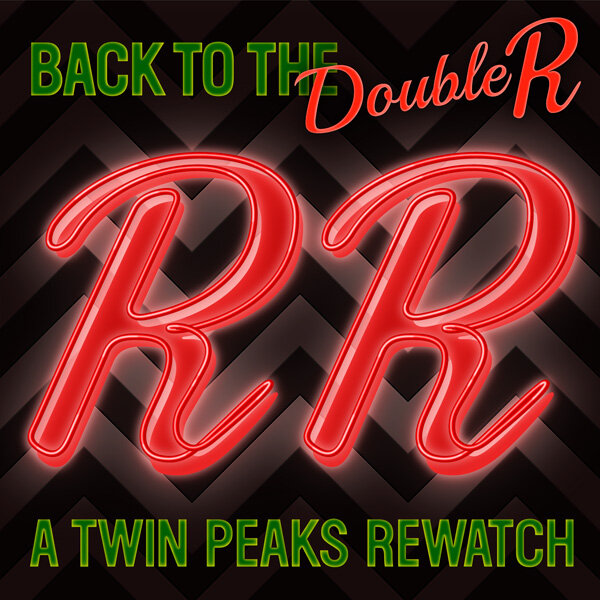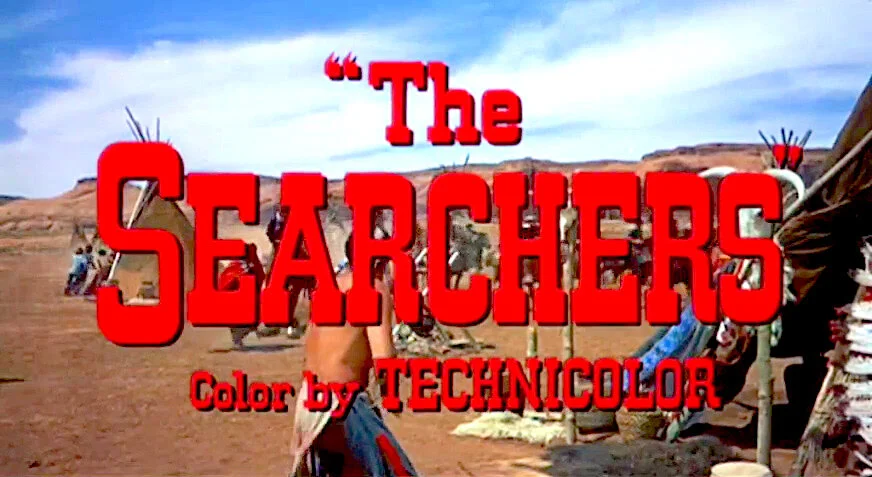“Thank ya kindly!” Hank Worden and the relationship between “The Searchers” and “Twin Peaks”
When your pop culture fandom goes as deep as mine does, you’re always looking for connections.
The decrepit old waiter who makes his entry into the Twin Peaks universe in the first scene of the Season Two premiere, “May the Giant Be with You”, is one of those actors who I always said to myself, “Where do I know this guy from?” He is played by Hank Worden, a veteran character actor from the golden age of Hollywood Westerns. In Worden’s first scene as the senile waiter, he brings room service to Special Agent Dale Cooper (Kyle MacLachlan), who is lying on the floor of Room 315 at The Great Northern Hotel with bullets in his belly. It is a typically Lynchian bit of extended morbid comedy, as the waiter, who moves lugubriously, does not even seem to notice how dire the situation with Agent Cooper is, even after Cooper asks him to call an ambulance. The Waiter leaves warm milk, Cooper asks if a gratuity is included, and then the waiter says, in a slow, warm drawl “Thank ya, thank ya kindly.”
Bingo. Boom goes the dynamite! That’s the connection. That line is Worden’s catchphrase, and he used it in several films, most notably in John Ford’s 1956 magnum opus, the John Wayne-starring Western The Searchers. Once I realized that, the connections between The Searchers and Twin Peaks started to manifest themselves.
Twin Peaks is an undeniable work of originality, but that doesn’t mean that its creators do not wear their influences on their sleeve. One of the major pleasures of rewatching the show is to puzzle out where David Lynch and Mark Frost are taking their inspirations from and how those influences drive their narrative. Some influences are obvious, as Twin Peaks borrows liberally from film noir, cop procedurals, and nighttime soaps. As has been observed by my co-host Jennifer Waits, Twin Peaks is also, at times, very much a Western.
The connections may not be obvious, as Lynch and Frost placed their story in a contemporary (to 1990) setting, and there’s no horses, or cowboys, or some of the more obvious tropes that would easily identify the work as a Western. But we do have some lawmen (one of whom wears a cowboy hat, another is an Indian), and the town itself is a frontier—both in its proximity to the Canadian border and to supernatural dimensions. A sense of rugged individualism permeates the characters. Sheriff Harry S. Truman (Michael Ontkean) tells Agent Cooper that the town of Twin Peaks is strange and peculiar and “that’s just the way we like it”. Finally, there is undeniably a sense of good vs evil in the show. Over a hot meal from the Double R Diner, Truman says this out loud to Cooper, speaking of a “darkness in these old woods” and that he and the Bookhouse Boys (basically a town posse of heroes local to Twin Peaks) there to protect the town against it.
The show is perhaps at its most Western in the ninth episode of Season Two, “Arbitrary Law”, where Agent Cooper finally puts all the pieces together and solves the mystery of who killed Laura Palmer (Sheryl Lee). The episode opens with a shot of our lawmen striding into frame, a trope of many Westerns. (Specifically, I thought of the scene in 1993’s Tombstone, where the Earp brothers and Doc Holliday stride into town before a dramatization of the legendary gunfight at the OK Corral, yet since that film came out after Twin Peaks you can’t say that specific scene influenced the show. Nevertheless, the shoe fits.) Right away, there is a sense of purpose and urgency amongst the lawmen to bring a murderer to justice.
The episode is also significant in that it provides a framework for the Waiter to make his return into the plot, right at the moment where the mystery is moments away from being revealed. As Cooper has gathered many of the characters to the Road House (which one could easily imagine as a saloon if this were 1889 instead of 1989), the last to arrive is the Waiter, who is escorted in by Major Briggs (Don S. Davis). By this point, the viewers know that when we see the Waiter, the Giant (Carel Struycken)—who has been Agent Cooper’s dream guide to the supernatural—is sure to follow with something important to say. The Waiter gives Agent Cooper a stick of gum, which prompts Leland Palmer (Ray Wise), who the audience knows is the murderer, to say he used to love that brand of gum as a kid. The Waiter says a phrase only previously heard in the Red Room in Cooper’s dream: “That gum you like is going to come back in style.” This triggers a flashback in Agent Cooper, who remembers what Laura whispered to him in the dream (note that this dialogue is not in the backtracked dialogue Laura and others have been using when in the Red Room): “My father killed me.” At this point, the Giant reappears, gives Agent Cooper back his ring as he promised to do when the mystery was solved, and the lawmen take the criminal away. As Cooper leaves, he stands in the doorway of the Road House—in this instance it can be seen as a portal between realms, and gives the thumbs up to the remaining townsfolk, among them the Waiter, who returns the gesture.
This is perhaps the most lasting image of Special Agent Dale Cooper. Content, fulfilled and perhaps filled with a boyish wonder. A smiling lawman standing in a doorway giving the thumbs up.
This brings me back to The Searchers.
The casting of Hank Worden is not by accident. Worden was part of a company of actors John Ford used repeatedly in his films, especially his Westerns. Worden often played a sidekick to the lead character played by the iconic actor John Wayne. And Mose Harper, Worden’s character in The Searchers, is the actor’s most memorable role. Lynch and Frost could have cast any number of old guys (and Lynch especially loves to use old men in his work) in this part but casting Hank Worden makes it explicit that The Searchers is an influence on Twin Peaks.
What also makes it explicit is the image of Agent Cooper standing in that doorway.
The Searchers uses doorways as a primary motif. The film opens with a shot from the inside of a darkened homestead, the only light coming from an open doorway. As the shot zooms out of the doorway—the vast and desolate beauty of Utah’s Monument Valley unspooling outward in widescreen VistaVision glory before us—John Wayne’s character, Ethan Edwards, makes his arrival. Ethan is coarse, unrefined, and holding onto his bitterness and prejudices. Yet he is also the hero charged with searching for his lost niece Debbie (Natalie Wood), and The Searchers follows Ethan along his manic and obsessive quest. By the end of the film, Ethan has rescued Debbie (not apologizing for spoiling a 65-year-old film) and returns her home. The film ends on another shot of a doorway. This time, the surviving family crosses the threshold into the safety and comfort of home—all save for Ethan. He stands in near silhouette, left hand clutching his right arm at the elbow, watches everyone go inside, then turns and walks away, knowing that some part of his soul is too uncouth and unsettled. The safety of home is something Ethan Edwards will never get to enjoy, and Wayne plays the character as self-aware enough to know he does not belong there. It is one of the all-time great ending shots in all of cinema.
Twin Peaks reverses this with Agent Cooper at the Road House. I interpret Cooper’s exit, where he smiles and gives the thumbs up as a sign that unlike Ethan Edwards, Cooper has gained acceptance into his newfound community.
The casting of Hank Worden and the shot in the doorway are the two very explicit references to The Searchers in Twin Peaks. What I did not realize when rewatching The Searchers is that the similarities between the movie and the show extend much deeper than that, and the differences between them are incredibly informative as to the larger themes Lynch and Frost are making.
I think the best place to start is with Agent Cooper and Ethan Edwards, along with the actors who portray them, Kyle MacLachlan and John Wayne. First of all, I think MacLachlan and Wayne are incredibly similar looking men. They’re both tall, strikingly handsome, dark-haired, and square-jawed. Agent Cooper almost always wears a crisp black suit underneath a duster-like trench coat; it is his uniform. Ethan wears a duster over the grays of the Confederate Army. Both men are tasked with bringing justice to a young girl. Both men operate as experts in their field, each with their own eccentricities that neither man cares to justify. Yet with Cooper there is growth. He moves on from the man who took a childish delight in seeing the small-town Sheriff Truman clash with the big-city Agent Albert Rosenfield (Miguel Ferrer—and it is interesting how Albert is one of the lawmen striding into frame at the beginning of the episode and how Albert and Truman stand next to each other at the Road House, signifying a healing between the men brought about by their respect for Agent Cooper). With Ethan there is no such growth, and therefore at the end of The Searchers, Ethan knows there is no place for him in his family’s homestead. He is a man stuck in the past, unable to shed his racism or penchant for violence.
It’s not simply the connections between the main characters—and one crucial supporting one—that knit Twin Peaks and The Searchers together. There are myriad connections. Look at the never-verbalized love Ethan holds for his sister-in-law Martha (Dorothy Jordan), communicated through glances and gestures. Isn’t that where we first find Big Ed Hurley and Norma Jennings (Everett McGill and Peggy Lipton), in the throes of unspoken love? Or how about the setting? Ford’s decision to shoot in Utah’s Monument Valley and Lynch’s decision to shoot amongst the tall, endless Douglas Firs of Washington are equally crucial to the stories they tell, each location representing, adventure, danger, and the pull of the unknown. My podcast co-host Colin Lingle says of both landscapes are used as pacing elements with a “deep, Zen-like nature” with inescapable peculiarities. The woods in Twin Peaks certainly suggest a sinister supernatural presence and the vistas of The Searchers visualize an untamed land and only the bravest and intense could attempt to wrestle a society out of it.
Echoes of Martin Pawley and Laurie Jorgensen (Jeffrey Hunter and Vera Miles) –the young lovers in The Searchers—are seen in the relationships with Bobby and Shelly (Dana Ashbrook and Mädchen Amick), Donna and James (Lara Flynn Boyle and James Marshall). There is plenty of innocence, and the young ladies are always two steps ahead of the young men they cannot help but love. Colin also notes that Jeffrey Hunter looks an awful lot like Dana Ashbrook, especially in the scene where Martin enters the film, leaping off a galloping horse in a cloud of dust and youthful vigor. I sort of think Martin reminds me of James Hurley in his sweet cluelessness. We can agree that Lynch and Frost begat Bobby and James from Martin Pawley; toughness and vulnerability and perhaps a sense of recklessness is what Ford, Lynch and Frost see as admirable qualities in young men.
An oft-criticized part of The Searchers is the comedic brawl between Martin Pawley and Charlie McCorry (Ken Curtis). Arriving deep into the film’s runtime, Ford understood that the seven-year quest Ethan and Martin have embarked on has no resonance unless there is a home worth returning to. A scenario is crafted where Martin literally fights for what he loves. Ford knew the domestic scenes back on the homestead were an important subplot and helped shape his overall vision of the West. That film makes time for romantic rivals to brawl and family to enjoy conversation and gift giving over dinner. How many different scenes are set at mealtime during Twin Peaks? And though Deputy Andy Brennan (Harry Goaz) and his rival Dick Tremayne (Ian Buchanan) never come to fisticuffs, their extended rivalry for Lucy’s affections get ample room within the narrative—and ample criticism (look too, how Kimmy Robertson plays Lucy as enjoying two men fighting over her, just as Laurie does). It also gives a chance for Andy to fight—in his own way—for what he loves.
Speaking of Andy, doesn’t he serve the same function in Twin Peaks as Mose Harper does in The Searchers—that of the fool? Both characters are there for comedic value, and both have moments where they become a savant. Lynch and Frost reinforce this connection in “May the Giant Be with You”. Right in the first scene, Cooper is shot, the Waiter brings him milk, and who is speaking on the other line? It’s Andy. No accident. Both characters also receive the most clear-cut happy endings. What does Mose want? When it is all over, he wants to sit in a rocking chair by the fire, and that is exactly the fate the film gives him. As for Andy, well stay tuned to the podcast. (p.s.: I think he is probably gonna get the girl)
There is even insight within the differences between the two films. The confrontational Ethan often finds himself at odds with Captain Samuel Johnson Clayton (Ward Bond), the Texas Ranger who leads the posse in the initial search for Debbie. Ethan consistently questions and undermines the authority of the Texas Ranger (to be fair, Ethan is also right). Yet in Twin Peaks Lynch and Frost from early on show Agent Cooper and Sheriff Truman perfectly willing to set egos aside and cooperate. Whereas Ford’s film shows men establishing order through confrontation, stubbornness, and individuality, Lynch and Frost emphasize vulnerability and cooperation.
I think where Twin Peaks deviates most from The Searchers is in these differing principles of masculinity. Again, to Ford’s credit, he recognizes that on some level, Ethan Edwards is beyond redemption. Although Ethan does indeed save Debbie (in a complete 180-degree change for the character that is essentially a Deus ex Machina), he is also the bastard that hates the Comanche so much he slaughters random bison, knowing that is a few less meals his enemies will have. He is not above killing them slowly. He’s the racist who can never accept Martin as his nephew because he has Indian blood, despite his brother and his beloved Martha adopting Martin and raising him as their own son. His bloodlust is so unsatiated that after Martin has killed Scar (Henry Brandon), the primary antagonist of the film, Ethan must take the fallen Comanche chief’s scalp. Cooper, when he finally comes face to face with Leland, reacts differently.
In what I consider to be the single most powerful scene in the entirety of Twin Peaks, Cooper demonstrates compassion to Leland as he dies. Killer BOB, the inhabiting spirit who has possessed Leland, expunges himself from his vessel by causing Leland to bash his dead into the window of the jail cell. It would be perfectly natural—perhaps even justified—to want to Cooper and Truman pump some bullets into Leland (Michael Horse’s Hawk also has his gun trained on Leland throughout). After all, Leland, in addition to murdering Laura, has also murdered Teresa Banks, Jacques Renault, his own niece Maddy Ferguson (also Lee), attempted to murder Ronette Pulaski and Dr. Jacoby (Russ Tamblyn), and has been drugging his wife Sarah (Grace Zabriskie) to make her docile and compliant so he can commit his crimes. And those are just the crimes we see. Instead, Cooper cradles Leland, and recites to this disgraced and cowardly father passages from the Tibetan Book of the Dead, providing a small measure of comfort as he passes. Cooper knows the hell that awaits Leland and understands that even a soul as wretched as his does not deserve complete damnation. Leland, for his part, seems to come to terms with the crimes he has perpetrated and has a vision of his daughter as he passes. It is a tremendously powerful scene—and expertly acted by MacLachlan and Wise—that shows the capacity for compassion, and not revenge is what makes a man.
But perhaps The Searchers is also advocating for compassion.In a scene about halfway through the film, as the search party again departs, Mrs. Jorgensen, Laurie’s mother (Olive Carey) laments, “Don’t let the boys waste their lives in vengeance!”I think this lament goes largely unheeded, especially regarding Ethan.Ford makes sure to include this perspective as an alternative for audiences largely receptive to the actions of the searchers as noble heroics.Lynch and Frost were listening though, and some 34 years later they offered their rebuttal.Great works of art are great in part because they are in dialogue with other great works of art.Both Twin Peaks and The Searchers speak to one another; agreeing and arguing and with each of those opposite conversations both Ford’s film and Lynch and Frost’s seminal series become stronger.







